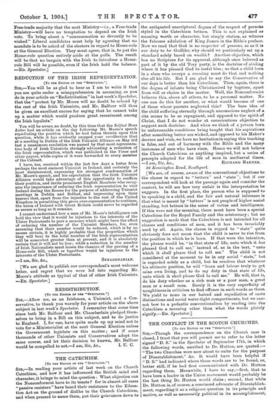(To THE EDITOR OP THE " SPECTATOR."1
Sip,—In reading your article of last week on the Church Catechism, and how it has influenced the British mind and character, it brings to mind the question : What objection can the Nonconformist have to its tenets ? for in almost all cases "passive resisters" have based their resistance to the Educa- tion Act on the ground of dislike to the Church Catechism, and when pressed to name them, put their grievances down to
the antiquated unscriptural dogma of the respect of persons styled in the Catechism betters. This is not explained as meaning worth or character, but simply station, as witness the fulsome adulation of King James in the Bible's preface. Now we read that God is no respecter of persons, so as it is our duty to be Godlike, why should we particularly set up a standard solely based on wealth ? Another objection, which has no Scripture for its approval, although once believed as part of it by the old Tory party, is the doctrine of abiding where it has pleased God to instal him ; so that a child born in a slum who sweeps a crossing must do that and nothing else all his life. But I am glad to say the Conservative of our days is better than his Catechism. Then, again, there is the dogma of infants being Christianised by baptism, apart from will or choice in the matter. Well, the Nonconformist believes this, above all others, to be a personal matter. No one can do this for another, or what would become of one of those whose parents neglected this ? The bare idea of the child suffering eternally through unconscious neglect of a rite seems to be so repugnant, and opposed to the spirit of Christ, that I do not wonder at conscientious objection to support such doctrine. And when we think of a person born to unfavourable conditions being taught that his aspirations after something better are wicked, and opposed to his Maker's decrees and wish, we have no hesitation in saying this teaching is false, and out of harmony with the Bible and the many instances of men who have risen. Hence we will not believe the Church Catechism as anything inspired, but a series of precepts adapted for the life of man in mediaeval times.
[We are, of course, aware of the conventional objections to the clause in regard to "betters" and " state "; but if our correspondent will look at the passage again and consider the context, he will see how very unfair is the interpretation he suggests. In the first place, the person who is supposed to be speaking is a child, and the fair and natural inference is that what is meant by "betters" is not people of higher social standing, but betters in the sense of virtue and intelligence. If this were not the meaning, there must have been a special Catechism for the Royal Family and the aristocracy ; but no suggestion is made that the Catechism is not intended for all classes and conditions of men, and it has been invariably used by all. Again, the clause in regard to " state " quite obviously does not mean that the child is never to rise from the position in which he is born. If that were the intention, the phrase would be, "in that state of life, unto which it has pleased God to call me," instead of, as in the text, "unto which it shall please God to call me." The child is not considered at the moment to be in any social "state," but is regarded solely as a child, but he resolves that whatever his ultimate position, he will "learn and labour truly to get mine own living, and to do my duty in that state of life, unto which it shall please God to cull me." He will, that is, do his duty whether as a rich man or a poor man, a great man or a small man. Surely it is the very superfluity of naughtiness in criticism to find offence in such words as these.
We yield to none in our hatred and repudiation of caste distinctions and social water-tight compartments, but we can-
not bow to a pedantic conventionalism by reading into the Catechism a meaning other than what the words plainly signify.—ED. Spectator.]






















































 Previous page
Previous page